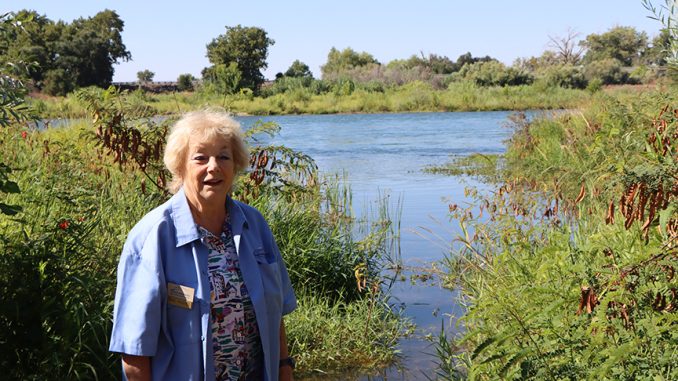
“There’s more to composting than saving food scraps,” says Bobie Hughes, Executive Director of the Sacramento River Discovery Center.
Hughes, who has been composting food waste at the Center for the past five years, is among a growing number of Tehama County residents committed to recycling unwanted food materials and reducing food waste. Food waste refers to any discarded or unused food which was originally intended for human consumption. This waste occurs at various food chain stages, from farms to individual households, and Hughes offers a practical approach to this problem.
“Composting is a good habit which creates another generation of food from food waste,” says Hughes.
According to Hughes, composting food scraps is one of the most effective ways to minimize greenhouse gas emissions generated by food waste decomposing in landfills. Hughes suggests using an easy, four-step process to develop a good compost pile:
- First, compost outdoors using three essential components: food waste (fruit or vegetable products), water and dry materials such as leaves, branches and grass.
- Second, ensure that the compost pile contains twice the quantity of dry material compared to the amount of water.
- Third, stir or mix the compost pile daily using a fork or a shovel to expedite decomposition.
- Fourth, allow an estimated four to six weeks for microorganisms to convert the food waste into compost, which can serve as a valuable fertilizer or a soil amendment to enhance depleted soil quality.
Hughes’ composting steps align with SB 1383, a law enacted last year on January 1, 2022, which requires California homes and businesses to recycle their food and yard waste. The regulations aim to divert food waste from landfills and require jurisdictions to provide organic recycling education and outreach programs to communities, businesses and food recovery organizations.
“I plan to incorporate this law into our regular classroom instruction,” says Hughes.
The Sacramento River Discovery Center staff provides classroom instruction to elementary school children and their parents in response to the community’s growing interest in composting. The Center’s composting program offers the following tips:
- Prevent food waste and support families experiencing food insecurities by donating surplus pantry food items to food banks.
- Reduce food waste by creating compost piles that convert food scraps and leftovers into valuable fertilizer.
- Proactively reduce food waste by adopting a practice of purchasing only the amount of food needed for household consumption.
The success of the Center’s efforts relies on the Tehama County community members’ and local businesses’ collective responsibility to reduce food waste in landfills, thereby decreasing the production of harmful greenhouse gasses.
“We (Sacramento River Discovery Center staff) share our knowledge of composting with the community to reduce the effects of climate change and positively impact the environment,” says Hughes.

For more information on SB 1383 and how it will affect Tehama County residents, visit www.tehamacountylandfill.com. This article was funded by a grant from CalRecycle.

